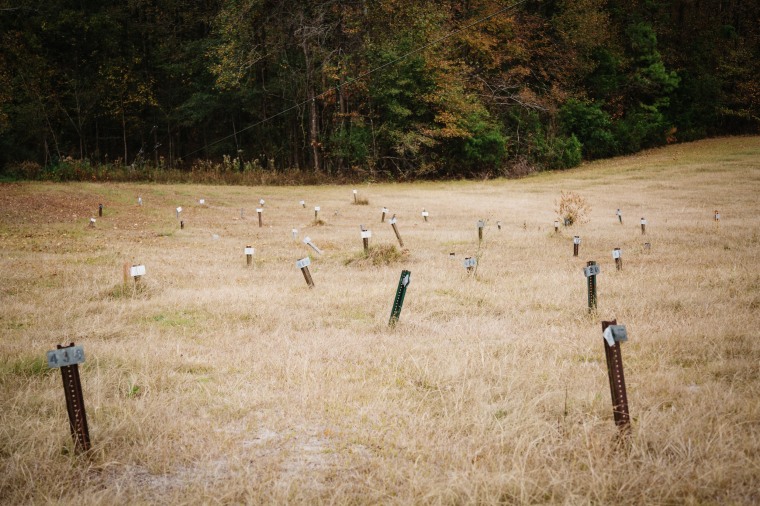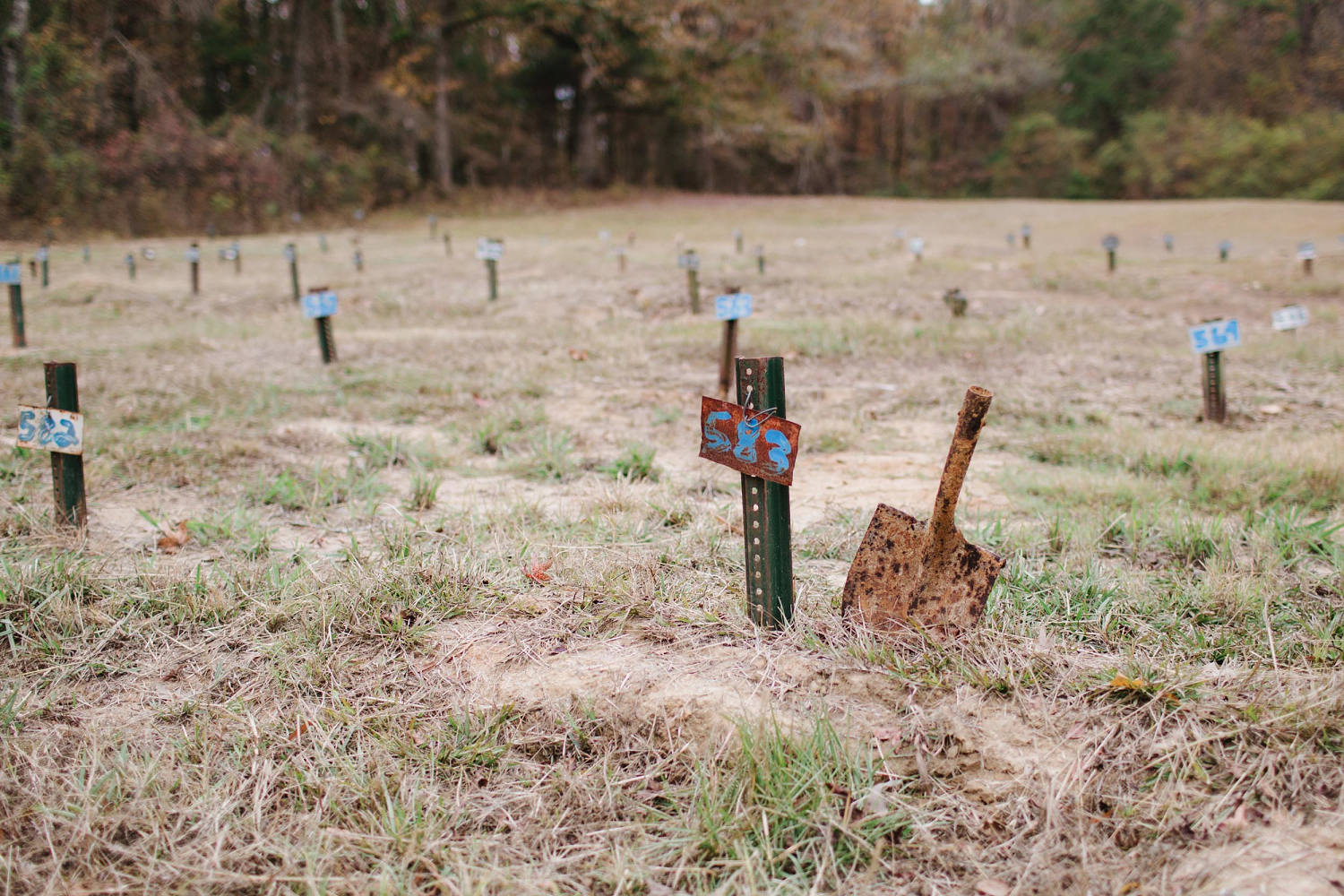This article is part of “Lost Rites,” a series on America’s failed death notification system.
A Mississippi coroner’s office under fire for burying people in pauper’s graves without their families’ knowledge has released a policy on death notifications that is unsigned and undated, making it impossible to know whether the guidance was in effect while the office was handling the botched cases.
The policy includes provisions that, if they were in effect over the past two years, appear to have been disregarded by Hinds County coroner’s office investigators.
The coroner’s office has not responded to questions about the policy, which the county provided to NBC News this month in response to a public records request.
Revelations about the failed notifications, documented by NBC News, have stoked widespread public outrage and calls for a federal investigation.
Coroners are required under Mississippi law to “make reasonable efforts” to contact the family of a person who has died, and if the body remains unclaimed after five days, they are allowed to seek a pauper’s burial. But in the deaths of Dexter Wade, Marrio Moore and Jonathan David Hankins, the Hinds County coroner’s office did not notify relatives that they had died. After going unclaimed for months, those bodies were buried in a pauper’s field on the grounds of the county jail work farm, their graves marked only by a number. The traumatized families say they would have claimed the men’s bodies if they’d known they were dead.
The Hinds County coroner’s office has said the police in Jackson, where the men died, were responsible for the failed notifications. The police have said it was the coroner’s job. In response to the uproar, the police department adopted its first death notification policy in November. The six-page policy is dated and signed by Chief Joseph Wade.
The coroner’s office’s policy, two pages long, addresses various aspects of the death notification process but is less detailed and contains typos.
The policy outlines who in a family should be considered next of kin — a spouse, then adult children, then parents, then adult siblings. It says investigators can ask hospitals for records on the dead person’s emergency contacts for leads on next of kin, but warns that phone numbers and addresses may be wrong. Notification “should be given as soon as possible,” the policy says.
If police are investigating the death, then the coroner’s office investigator should speak to the police investigator to determine who will deliver the news to the family, the policy says. If police choose to do it, then the coroner’s investigator should ask to be told when the notification has been given, and then follow up with the family to confirm.
Lost Rites
The policy also states, with a misspelling: “The name of any decedent should not be released to the media or other outside resources until you know that nest of kin has been notified.”
If a family has heard about a loved one’s death from the media or other outside source, investigators should apologize, the policy says.
But that is not how the cases examined by NBC News were handled.
Dexter Wade was struck and killed by a Jackson police car last March. A coroner’s office investigator said he tried calling Wade’s mother soon after the collision and then shared her information with police, who didn’t notify her until August. Jackson Mayor Chokwe Antar Lumumba has since offered his condolences and blamed communication failures.

After Marrio Moore was found bludgeoned to death on Feb. 2, a coroner’s office investigator said in a report that she dialed a brother’s number but it was disconnected. His family knew nothing until October, when a local NBC affiliate published an article that listed his name as a homicide victim. Moore’s sisters sought an explanation from the coroner’s office investigator, who told them that police should have contacted them. The investigator told the sisters that Moore had been “buried in a massive grave” in “an undisclosed location,” according to a recording of their conversation provided by the family. The family says the investigator did not apologize for the way they found out.
Jonathan David Hankins was found dead in a Jackson hotel room in May 2022, but neither the coroner’s office nor police told his mother, who reported him missing. A coroner’s office investigator said he gave Hankins’ information to police for notification; police say they never got that information. NBC News notified Hankins’ mother in December 2023 after finding his name on a list of missing people and on a list of people buried in the pauper’s field. Hankins’ mother said she has not received an apology from the coroner’s office.
Experts said it was good that the Hinds County coroner’s office has a policy covering death notifications, although they said it’s missing some important things.
Joseph Morgan, a former investigator for the Fulton County Medical Examiner’s Office in Atlanta who now trains investigators and teaches at Jacksonville State University in Alabama, said the coroner’s office policy doesn’t include enough guidance on how to find a person’s family and confirm who the next of kin is. “It’s a very thin document,” Morgan said.
He added that performing a death notification without care — or failing to do it at all — causes families avoidable harm.
“Contacting the family goes to the heart of what we do, and absent that you are no longer in the process of being a human services organization,” Morgan said. “I don’t know what you are at that point — you are a dull, faceless entity that’s not displaying a lot of compassion.”
Victor Weedn, a former medical examiner in Maryland and New Jersey who has helped develop national standards on communicating with next of kin, said the Hinds County policy seemed “reasonable” but it does not provide enough direction on how hard an investigator should try to find a dead person’s family.
“The biggest major omission is what constitutes an adequate effort to find the next of kin before you bury him in a pauper’s grave,” Weedn said.
The national standards, recommendations written by a committee of the National Institute of Standards and Technology, stress the need for investigators to be sensitive to the different ways families grieve, to explain to them how death investigations work, to respond quickly to their questions, and to make sure they understand their right to investigation reports. Agencies “should have a policy regarding how, when and which next of kin are contacted,” the standards say, but do not suggest what those policies contain.

Two national accreditation organizations, the National Association of Medical Examiners and the International Association of Coroners & Medical Examiners, require member agencies to have a policy on death notifications, but also do not specify what those policies should say.
The Hinds County coroner’s office is not accredited by the two organizations. The Mississippi Medical Examiner’s Office said it leaves it to local agencies to develop specific policies on death notifications.
Dennis Sweet, a Jackson civil rights lawyer who is representing the families of Wade, Moore and Hankins, said the Hinds County coroner’s office policy appeared to be good. But the lack of a date or signature gave it an informal appearance that made him wonder if it carried much official weight.
“It’s better than nothing,” Sweet said. “Except they clearly didn’t follow it.”
Source: | This article originally belongs to Nbcnews.com










